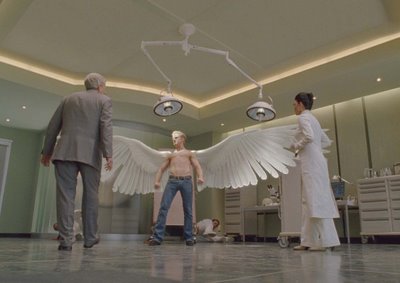
One of the really cool and poorly executed premises of X-Men: The Last Stand is that someone has created a cure for the X-factor (the mutated gene that gives mutants their powers), stirring controversy between mutants who want to be cured and mutants who are offended by the suggestion that they need curing, with obvious parallels drawn between mutants and homosexuals. So of course the question that I left the theater with was: If there were a cure for homosexuality would I take it?
It's a hard question. Considering the fact that I am married to a woman and the ideal would be for me to be attracted to her and no one else, it seems like I should not have to think twice about taking a hypothetical "straight pill." Yet still I hesitate.
Part of the problem is that being attracted to men is such an ingrained part of me that I cannot imagine myself otherwise. I don't talk about it all that much for a lot of reasons, but in truth I am very aware of my sexual orientation for a good portion of each day of my life. I work in a public place, and while I have to say that a good 80% of the male population of the world is entirely unattractive, that 20% that's left still adds up to quite a few men I interact with on a daily basis who, on some level or another, attract me. Even before my mission, when I was participating in reparative therapy with the supposed intent to change my sexual orientation, I never could imagine myself seeing a good-looking man and not feeling some kind of draw toward him. I suppose what it comes down to is that I cannot conceive of a Straight Master Fob, so if I were to eliminate the Gay Master Fob I'm not sure who would be left.
The other part is that, as much as I am philosophically opposed to pride, I take a certain pride in being different--different from the 90 to 95% of men in the world who are straight, and also different from the 4.99 to 9.99% who are gay but either closeted or in gay relationships but not openly gay and in a straight relationship. This is a silly reason. I hang my head in shame.
In theory I don't believe sexual orientation should be such an important factor in one's identity, but in reality it's a big part of how I see myself. Perhaps it's just that for such a long time I was unwilling to openly acknowledge that part of me, so now I'm giving it more importance than it deserves as compensation. Ideally, I suppose, with time I'll settle down to a healthier view of myself as a human being, independent of whether I call myself gay or straight.
You can bet, though, that if my sexual orientation were big white wings growing out of my back or kickass telekinetic powers, I would not give them up and I would not feel the least bit of angst over it.





8 comments:
I think whenever we take an outside force whether it is a pill, plastic surgery, or other, we are changed and something so intrically "us-ish" is lost. There are so many things I would like to change about my outward appearance and even in the crazy thing I call my head. But I think all my "bad parts" are what makes me original.
So stay pill-less and winged.
Yeah, sometimes I wonder, if someone offered me a pill that would make me not depressed, would I take it?
oh, wait, hell yes.
"In theory I don't believe sexual orientation should be such an important factor in one's identity, but in reality it's a big part of how I see myself."
I think that sexual orientation is an important factor in everyone's identity, but because being straight is the norm, then we are more able to recognize the importance of sexual orientation of those in the gay minority. I could totally be wrong, but I don't think I am.
It's interesting when I talk to people who see homosexuality in black and white terms. One thing I have heard these people say is that homosexuals have an obsession with their homosexuality. I think that is an unfair assessment because I don't think that homosexuals have more of a an obsession with sexuality than heterosexuals.
Sexual orientation is a huge part of every individual's life. I talk about my friends who are dating, or my friends who are getting married. I talk about and obsess over my own love life. I think about men who maybe possibly I could be attracted to, I think about men who I am definitely attracted to, and I complain about men who I am not attracted to who are attracted to me.
Take a walk around BYU campus and listen in on people's conversations. Everyone is constantly talking about relationships. It's comical. And I believe that it is evidence of everyone's obsession with sexual orientation (usually straight) or sexuality.
Like I said, I could be wrong. I am leaving out the part that being outside of the majority, you are probably forced to think about your sexual orientation a little bit more because you notice where you are different. But I guess what I'm trying to say longwindedly is that you should have no problem with recognizing that your sexual orientation is integral to your self image. I think it is for everyone.
Good point, Cicada. I certainly would not say (or at least not mean) that sexuality is not important. Sex and love and everything related are wonderful things and a big part of being human. My concern, I suppose, is that in general people place too much importance on that part--whether it's defining oneself by one's sexual orientation when so many other factors should play a role in identity or obsessing over romantic relationships when there are so many other kinds of relationships that matter almost as much. My other fear is that I will overplay the minority card, using that as an excuse to place undue emphasis on one aspect of my idenity and my life while ignoring others.
It seems to me that being happy with who you are IS a healthy attitude. Aren't the real challenges in life more related to what we DO with who we are?
I'm convinced that every life comes with it's own set of challenges, and while it's tempting to think that my life might be easier if I were like someone else instead of like me, maybe it would end up being just the opposite. On the other hand, maybe it WOULD be easier, but then I'd get to the other side, and say 'what a waste of time! I didn't learn anything I didn't already know!'
I think the idea of taking something in order to "cure" what supposedly causes people to be unhappy and outside of the norm can apply to many different things including mental disorders, personality disorders, learning disabilities, homosexuality, and depression. The problem with taking a pill or using any kind of chemicals as a cure is that it will take away something that is intrisically 'you' and, at the same time, the chemicals will cause changes that are not 'you'. I think that sometimes people find that it changes things that they did not want changed or produces results or side effects that are worse than the original problem. The periods of my life when I was forced to take medication were some of the worst even though I was 'cured' in that one aspect. I felt that I was not myself in many ways. It's actually quite a creepy experience.
Now that I have full control of whether or not I will take medication, I have learned to weigh the pros and cons. Usually, I choose not to take medication that will alter who I am or even how I precieve myself.
To sum up my long rant, I don't think that the proposed 'cures' necessarily make you happier, however, if the individual finds that it does or that the benifits outweigh the negatives then I think that medication is a viable option. However, the only way of knowing is to try it, but if it is a one shot thing (like where one shot will cure you for life) and there is no turning back, it would be a difficult decision to make. Not knowing the outcome, side effects or even how you would feel without that aspect of your personality would make it difficult, at least for me, to accept a so called 'cure'.
It's funny, because I was wondering how you would respond to the idea of a pill that would make you straight. I'm not surprised by the answer. ;)
Everyone who is married has to deal with the struggle of being married to someone and attracted to many other people. It is not just a homosexual thing. In the end, marriage is about much much more than sexual attraction... which point you have eloquently made. I just think that it is important to note that the "problem" of attraction to other people than ones own spouse is not unique to those attracted to people of the same gender.
Post a Comment